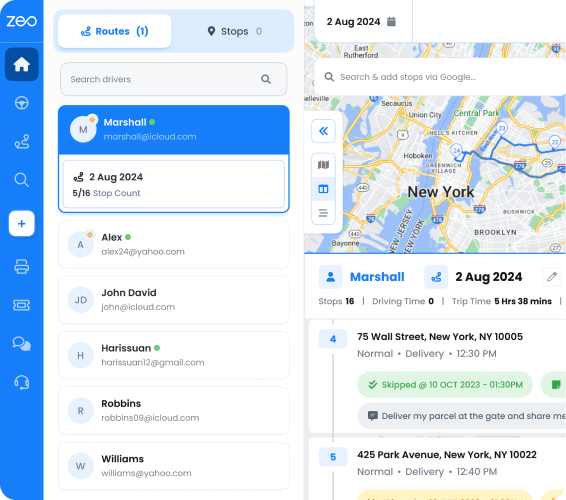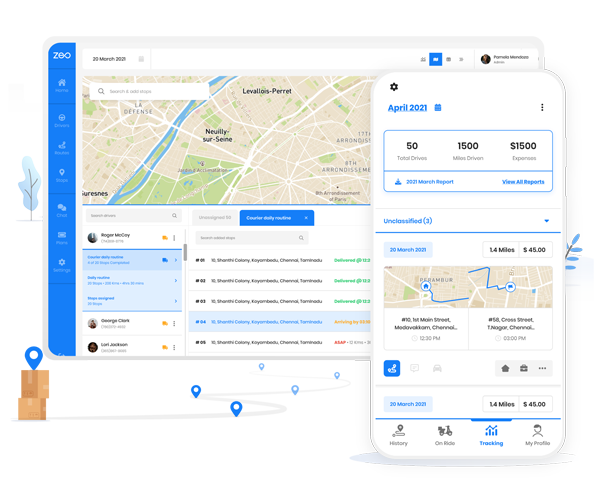Updated on: July 21, 2025
The world of automotive logistics is like a high-stakes chess game where every move counts. A single misstep, a delayed shipment or an inefficient route can trigger a domino effect of rising costs, missed deadlines, and frustrated customers. In an industry that powers global supply chains, precision isn’t just a nice-to-have; it’s a must.
But how do businesses keep up with the ever-changing dynamics of traffic, fuel prices, and delivery expectations? The answer lies in Logistics Route Optimization, a solution that transforms operational complexities into growth opportunities. Let’s understand the complexities of automotive logistics and why route optimization is the backbone of successful automotive logistics.
The Complexities of Automotive Logistics
Navigating the intricate web of automotive logistics is no small feat. It’s a constant balancing act with unique challenges:
- Diverse Supply Chains
Automotive logistics isn’t a one-size-fits-all operation. It involves managing a complex ecosystem of raw material suppliers, component manufacturers, distributors, and dealerships spread across geographies. Each link in the chain must function seamlessly, but even one hiccup, like a delay at a supplier, can lead to significant disruptions. This complexity demands a solution that ensures efficient deliveries, and that’s where route optimization shines. - Dynamic Operational Variables
Think about unpredictable traffic patterns, sudden road closures, fluctuating fuel prices, and evolving delivery schedules. These ever-changing variables make planning routes a logistical nightmare. Without a real-time strategy in place, businesses risk inefficiency and lost revenue. Advanced Logistics Route Optimization adapts to these variables in real-time, turning challenges into opportunities for smoother operations. - Time-sensitive Deliveries
Late shipments aren’t just inconvenient; they can halt production lines, delay customer orders, and damage your reputation. Automotive logistics is a high-pressure environment where every minute counts. Route optimization ensures time-critical deliveries are prioritized and executed flawlessly, protecting business relationships and revenue streams. - Rising Operational Costs
With fuel prices soaring and labor costs climbing, inefficiency becomes a costly affair. Poor route planning translates to wasted mileage, increased wear-and-tear on vehicles, and higher expenses. By integrating route optimization, businesses can mitigate these costs and redirect savings toward growth initiatives.
Why Route Optimization is Essential in Automotive Logistics
The complexities of automotive logistics make it clear: Logistics Route Optimization isn’t just helpful, it’s critical for business growth. Here’s why:
- To Reduce Fuel and Operational Costs
Fuel and maintenance expenses form a significant portion of logistics budgets. Route optimization tackles this by identifying the shortest and most efficient routes for deliveries, minimizing unnecessary mileage and idling time. As a result, businesses save money on fuel and reduce vehicle wear and tear, leading to lower operational costs. This not only improves profit margins but also frees up resources to invest in other growth areas, like technology or workforce training. - To Ensure On-Time Deliveries
In automotive logistics, delayed deliveries can disrupt production schedules and damage customer trust. Route optimization ensures that deliveries are planned effectively so that shipments arrive as scheduled. This reliability strengthens client relationships and boosts brand reputation, helping businesses secure long-term contracts and repeat customers. - To Maintain Supply Chain Continuity
A seamless supply chain depends on the consistent movement of goods, especially in time-sensitive industries like automotive logistics. Route optimization helps maintain this flow by minimizing disruptions caused by traffic or inefficient routing. When every link in the chain functions smoothly, businesses can avoid bottlenecks and delays that could otherwise escalate into costly supply chain interruptions. - To Achieve Sustainability Goals
As businesses increasingly focus on sustainability, route optimization plays a pivotal role. By reducing fuel consumption and emissions, optimized routing aligns operations with environmental goals. This not only helps businesses meet regulatory requirements but also enhances their brand image as eco-friendly, appealing to customers and partners who value green practices.
Business Benefits of Logistics Route Optimization
While the functional advantages of Logistics Route Optimization are evident, its business benefits are equally compelling:

increase fuel savings
Save $200 on fuel, Monthly!
Optimize routes with our algorithm, reducing travel time and costs efficiently.
Get Started for Free
- Increased Delivery Capacity
Route optimization enables drivers to complete more deliveries within the same timeframe by streamlining travel paths and minimizing downtime. This increase in capacity allows businesses to handle higher delivery volumes without adding resources, leading to better scalability and revenue growth. - Competitive Advantage
By optimizing routes, businesses can offer faster, more reliable delivery services compared to competitors. This differentiation can attract new customers and retain existing ones, giving the business a significant edge in the competitive automotive logistics market. - Driver Productivity and Satisfaction
Efficient routes not only save time but also reduce stress for drivers by eliminating unnecessary complexities and frustrations on the road. Effectively managing drivers becomes important. Happy, productive drivers are more likely to stay with the company, reducing turnover rates and training costs while ensuring consistent service quality. - Business Agility
Route optimization equips businesses with the flexibility to adapt to sudden changes, such as last-minute orders or unexpected delays. This agility ensures uninterrupted operations and allows companies to quickly respond to customer needs, enhancing their reputation for reliability and responsiveness. - Strengthened Brand Image Through Sustainability
Adopting route optimization showcases a commitment to sustainability by cutting fuel usage and reducing emissions. This proactive approach positions your business as an environmentally responsible leader in automotive logistics, attracting eco-conscious customers and partners while differentiating your brand in a competitive market.
Conclusion
In the intricate world of automotive logistics, success depends on operational precision, adaptability, and efficiency. Logistics Route Optimization isn’t just a technological upgrade; it’s a strategic necessity that drives cost savings, customer satisfaction, and sustainability. Businesses looking to stay ahead of the curve need a smart and robust route planning tool.
Zeo Route Planner stands at the forefront of this transformation, offering cutting-edge route planning solutions tailored to the demands of automotive logistics. With a deep understanding of industry challenges, Zeo delivers the tools businesses need to streamline delivery operations and fuel growth.
Ready to revolutionize your logistics? Discover how Zeo can redefine your delivery game. Try Zeo today and experience the difference!

Are you a fleet owner?
Want to manage your drivers and deliveries easily?
Grow your business effortlessly with Zeo Routes Planner – optimize routes and manage multiple drivers with ease.

increase fuel savings
Save $200 on fuel, Monthly!
Optimize routes with our algorithm, reducing travel time and costs efficiently.
Get Started for Free




















